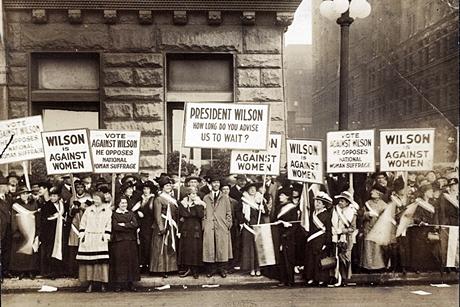Bright Anniversaries In Uncertain Times
3L Louisa Fredey and law librarian Nicole Dyszlewski note that 2020 marks the centennial of two milestones – nationally, women gained the right to vote; and in Rhode Island, the right to practice law. But how have these events changed our world – and what comes next?

How will 2020 will be remembered? Certainly as the year of COVID-19. Doubtlessly as a year marked by a contentious presidential election. And one in which a much-needed racial justice reckoning took hold.
But amid all this, we should not forget that 2020 also marks a momentous anniversary for our country and our state. For it was 100 years ago, in 1920, that women, nationally, finally won the right to vote; and, in Rhode Island, also to sit for the bar and practice law in Rhode Island.
It was Elizabeth Buffum Chace who submitted the first petition for women’s suffrage to the Rhode Island General Assembly in 1867. It stated, “We, the undersigned, women of Rhode Island, would respectfully represent, that, being law abiding citizens of said State, we are denied the elective franchise, solely on account of our sex.” Of course, it would be more than 50 years before that concern was addressed on January 6, 1920, when the Rhode Island General Assembly ratified the 19th Amendment.
That same year, on September 24, Ada Sawyer – longtime secretary to a male Providence attorney – sat for the Rhode Island bar exam after Supreme Court Associate Justice William H. Sweetland ruled that she qualified as a “person” under the law, and was therefore eligible to be an attorney in spite of her gender.
Today, 54 percent of the current first-year class at Roger Williams University School of Law – Rhode Island’s only law school – identifies as female, as does roughly 36 percent of the membership of the Rhode Island Bar Association. Those numbers are something to celebrate. As voters and lawyers, women attorneys today stand on the shoulders of those who creatively and bravely fought to secure the rights we enjoy today.
And yet, we have not reached the “happy ending” of either story. Voter suppression, unfortunately, remains an issue to this day. And though the African-American Rhode Island suffragist Bertha Higgins is quoted in one source as claiming that a certain “Mrs. Parker, one of our race [Black], was the second to register” to vote in Rhode Island, progress has been imperfect. Rhode Island, for example, still has a voter identification law – a type of law that is known to disproportionately impact communities of color.
Likewise, gender discrimination in the legal field persists – and again, these issues are further amplified for women of color.
One final anniversary: on October 8, 1920, the League of Women Voters of Rhode Island was officially established. This year, also on October 8, members of the legal community will be celebrating the complicated legacy of this centennial – and, as with so many aspects of 2020, it is a celebration that will be overshadowed by the stark reality of just how far we still must go to obtain true equality.
==========
RWU Law will be holding a free virtual event on October 8, “100 Years After the 19th Amendment: Their Legacy, and Our Future.” For more information, visit law.rwu.edu/events.
Nicole P. Dyszlewski, Esq., is Head of Reference, Instruction, and Engagement at Roger Williams University School of Law Library.
Louisa Fredey is a law student pursuing a dual J.D. in law and M.S. in cybersecurity. Slated to graduate in 2021, Fredey is also president of the Women’s Law Society.
